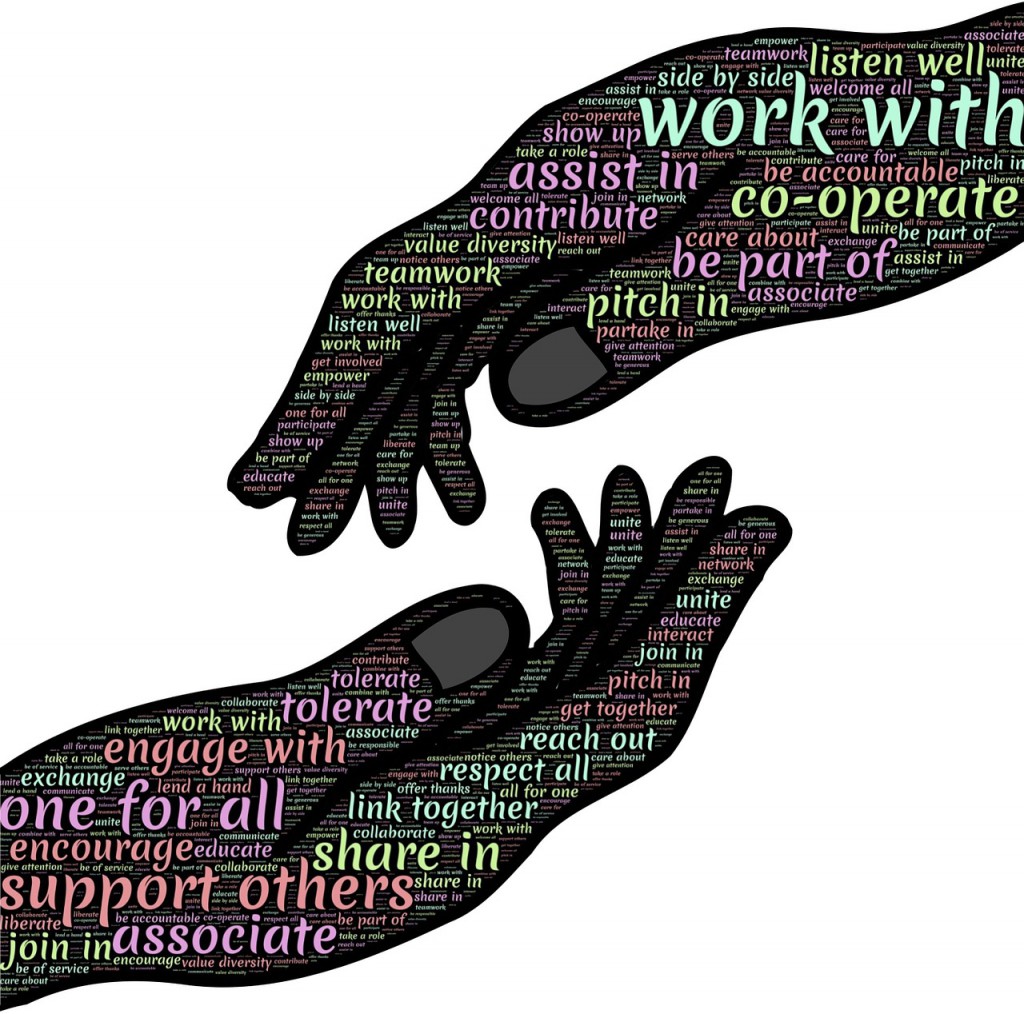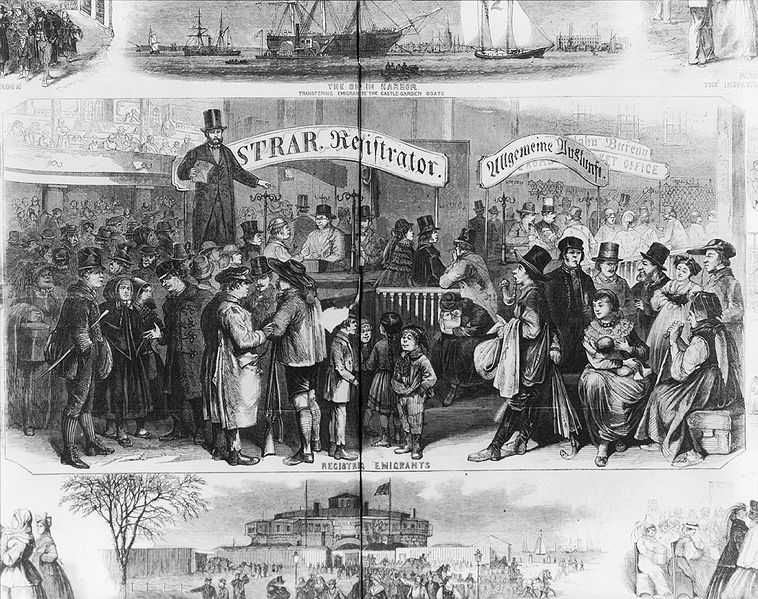We’ve talked before about different ways you can improve your English while you’re in New York City. Another great way is to volunteer; this is when you help a group or ogranization for free. Volunteering in NYC will help you make new friends and improve your English while doing good things for others.

What is the best way to learn a foreign language? There are basically three options: 1) You can study by yourself using resources from the internet or books. 2) You can sign up for classes at a local school. 3) Or, you can move to a country where the language is spoken and learn through immersion. Here at NYEA, we believe that language immersion is by far the best way!
 TOEFL Test Day: What You Can Do to Make It Stress Free
June 12, 2015
TOEFL Test Day: What You Can Do to Make It Stress Free
June 12, 2015

You’ve finished your TOEFL iBT Preparation course, taken practice exams, and registered for the test—you are ready for TOEFL! Or are you?
Apart from studying, there are many things you must do to prepare for TOEFL. Many students are unaware of the test requirements and the procedures on test day. Follow our guidelines and you will be mentally, physically, and logistically ready for your TOEFL exam. (more…)
 Daily Activities That Will Improve Your English
October 13, 2014
Daily Activities That Will Improve Your English
October 13, 2014
The key to making quick progress when it comes to learning English is to try and make a lesson out of everyday activities; to try and constantly learn and improve yourself. It can be found in the small things, like learning a new word or knowing the right question to ask when needed. Since you will be living and studying English in New York City, there is no shortage of situations where you can use whatever you have learned in class. If you don’t know exactly where to start, here is a list of great places to begin practicing English while walking around the city.
 Alternative Ways of Studying English in New York City
October 2, 2014
Alternative Ways of Studying English in New York City
October 2, 2014
If you are about to start learning English at the New York English Academy, it means you probably have already arrived in New York City. You must be excited about exploring Manhattan, seeing the sights, going out, making friends, and meeting your fellow students and teachers.
 How Can I Learn English Faster?
October 1, 2014
How Can I Learn English Faster?
October 1, 2014
Staff member Tamila, whose first language is Russian, has become fluent in English – and it has not taken her a lifetime! Here are some of her observations:
The question about learning English faster comes to the minds of many people who travel or move to or study in the United States. How long does it take to learn it well? I cannot give you an accurate answer because every person learns new things at his or her own pace; however, I have five useful tips that will help you to learn English a little bit more quickly.
- Listen to English songs. People love listening to music on the streets, in parks, on trains, at work, and at school. And I am sure, you love it too. Since the American music industry is very popular around the globe, each of us has at least one favorite American song. So take advantage of it: Read the lyrics while listening to the song. The good thing about learning English with songs is that it is much easier to pronounce and memorize the words.
- Watch movies with English subtitles. Go to the movies or watch them from home. Choose a movie that you have already seen and watch it with English subtitles. It will help you to learn English vocabulary and see the structure of dialogues.
- Communicate with Americans. When I arrived here, I was very reluctant to talk a lot or to make friends among the American people. Mainly, it was because I didn’t want them to hear mistakes in my English and in my accent. However, with time I realized that if I don’t start communicating with native English speakers, I will never learn this language. So I started to talk with them everywhere: on the street, in supermarkets, offices, etc.). While I was at school, I made many American friends, who have helped me to improve my English greatly, I believe.
- Work on your accent/pronunciation. I had never paid attention to my accent until I came here and realized that few people could understand me. So every time I learned a new word, I would not only check its pronunciation, but also try to find it in a song or a movie to see how Americans pronounce it.
- Use an English dictionary. Honestly, I was skeptical about English dictionaries at the beginning. If there was an English word I didn’t understand, I would simply use a Russian translator. Please, don’t make that mistake! Using an English dictionary is much more helpful than using electronic translators of your native language. Dictionaries of the English language define words using English synonyms. The choice of English dictionaries is really broad: those accessible online; inexpensive but comprehensive paperbacks that you can purchase in most bookstores; and those that you can find in public libraries.
PC TECH: English Language School in New York City
 Put Your English to Use in “The City”
June 17, 2014
Put Your English to Use in “The City”
June 17, 2014
Practicing what you learn, as soon as you learn it, is the only guaranteed method for truly incorporating your English studies into your daily life. This means that regardless of your current level and abilities as a student, you can improve and learn faster by actually using the language.

It doesn’t really matter how you use it. Whether you watch an English language movie, read a book, navigate the city, order food, talk with natives, or something in between, challenging yourself to use English and overcome the initial shock and shyness of using a second language is a must. And because you are lucky enough to be studying English in one of the largest, most diverse, culturally rich cities in the world, the learning experience can be much easier and rewarding.
Where to Practice
For example, all it takes for a beginner student to explore the city is some basic vocabulary and numbers. Pick a safe area and try to figure out street numbers, bus routes, and so on. Take it a step further by asking people for directions to see how well you would do in a real-life situation.
More advanced students can use what they learn to interact with people. They can seek out employment, try to make friends online or even talk to people in bars, clubs, or other cultural events. Speaking of cultural events, if you have the inclination and are open to trying new things, you can even practice your English by joining an amateur theatre company, an improvisation class, or a poetry class.
If you are confident enough and your skill level is somewhere between intermediate and advanced, you can try your hand at some dating sites or go to a singles bar. While flirting might require a larger vocabulary, what better motivation can anyone have than possibly finding a significant other?
If you’re not that into group activities or socializing, you can still apply what you learn by exploring the city by yourself. Treat yourself to a great meal or several local fast food spots. Try to identify each item on the menu, figuring out what it’s made from and how to ask to change the order if you don’t like an ingredient.

Shopping at the supermarket is another fantastic way to increase your vocabulary with some very useful words. Basics like what to say at the checkout or asking what aisle a specific food is in are extremely important in the long run. When shopping, try to spice things up by going to specialty food stores like natural/organic grocery stores, international markets, and farmers markets.
Another interesting way to practice English and experience New York City at the same time is by studying the city and its rich history. When passing by historical buildings, take a moment to stop and read the information presented near monuments, statues, or on plaques. You can follow up on what you read by doing research on how the historical events or people changed the city’s history.
 Learn to Speak Like a Native New Yorker
June 10, 2014
Learn to Speak Like a Native New Yorker
June 10, 2014
If you will be spending some time in New York City, you might as well learn to speak like a New Yorker. While native New Yorkers are a rarity, the New York City accent is still widely found throughout the five boroughs, helping give the city much of its charm.

You will have no problem recognizing the accent as you have probably already heard it in cartoons or movies. While you may associate it with sleek gangsters or gritty and jaded police officers, the characteristics of the New York City accent make it quite a unique and interesting subject to study. If you want to impress the people back home and your friends that speak fluent English, or you just want to have a cool party trick, why not practice some of the accent’s more easily identifiable features.
Elusive “R”
The most recognizable, almost stereotypical New York pronunciation is the elusive “r.” Most commonly, the “r” consonant is not pronounced, especially when it is found in the middle of a word. The exception to this rule is when the “r” is situated at the end of a word or is followed by a vowel.
In the past, the silent “r” was considered a sign of immigrants or the lower class, therefore, it was stigmatized. While still popular, the number of New Yorkers that drop the “r” is dwindling.
Intrusive “R”
The intrusive “r” is a different phenomenon where the consonant attaches itself onto words that normally don’t include it. For example, the phrase “law and order” is sometimes pronounced as “lawr and order” or “idea” becomes “idear.”
Glottal Stop
Some linguists say the glottal stop is heavily influenced by the southern English and cockney accents. Within the United States, the greatest number of people using the glottal stop [ʔ] is centered in New York City.
The easiest way to spot the glottal sound is in the pronunciation of “bottle,” where the double “t” is replaced by the glottal sound. As it can be difficult to express what the glottal stop sounds like in writing, the best way to learn is to ask your PC TECH teacher for help or search for audio references on the Internet.
Intrusive “G”
Similar to the intrusive “r,” the intrusive “g” is one of the most stereotypical sounds found in the New York City accent. It is uncommon to all other regions of the United States and was once considered as a sign of the lower classes. The best example of the intrusive “g” can be heard when pronouncing “Long Island,” which is commonly heard as “Lawn Guyland.”

Short “A” Split
Another typical New York pronunciation is the short “a” split which most of us will recognize from the cartoon character Bugs Bunny. When words include the “a” vowel, like “cab” or “avenue,” the “a” is sometimes pronounced as “i-uh,” resulting in “ki-uhb” for cab and “i-uhvenue” for avenue.
While in the past, the short “a” split was most commonly associated with New York City, nowadays, it is rare to hear even locals use it.
These examples are just some of the most recognizable characteristics of the New York City accent. By digging deeper, you will uncover a linguistic treasure trove of the city’s unique vocabulary, grammar, pronunciations, and sayings, as well as have a greater awareness of the historical, geographical, and social factors that created this endearing accent. With study and practice, even you can one day be mistaken as a native New Yorker.
 Why Not Start a Blog?
June 3, 2014
Why Not Start a Blog?
June 3, 2014
As a student, moving to New York City is definitely an adventure you will always remember. It can be life changing, not to mention incredibly fun. So, you may want to write down some of your adventures, day-to-day routines, and general impressions of the city to share with friends and family, as well as to have a record of your time spent in the world’s greatest city.
Your New York City adventure is of course intertwined with your English learning journey so why not bring the two together? A blog can be a great medium to do both. It offers any easy-to-use platform for expressing your most meaningful experiences while reinforcing and building upon your English writing skills, such as spelling, punctuation, grammar, and local sayings.
Life in New York
Living in such a culturally rich and vibrant city will make for some amazing stories. Writing about your favorite locales, restaurants, parks, and clubs are all great topics for your English blog. You may also consider writing about concerts you’ve attended, sporting events, or what makes New York City so unique.

How about your day-to-day experiences such as taking the subway? Because there are so many people like you that are drawn to this city, writing about these experiences can help them, too. Tips on finding a decent apartment, exploring different neighborhoods, getting a bite to eat, and shopping for bargains are all great topics to write about.
Learning English through Writing
Writing a blog is a great way to practice the English you’ve learned. Apart from the benefits already mentioned, it will give you a chance to improve your vocabulary, as with each post you will need to look up more and more words in the dictionary.
Furthermore, you can easily track how your English is improving and learn what weaknesses you should focus on. This will save you time and give you a clear understanding of your abilities. And, if willing, you can ask your PC TECH teachers, fluent speaking friends, or other native speakers to give feedback and corrections on your posts.
It should also be mentioned that a successful blog can earn you some money on the side through advertisements and sponsors. At the very least, it may come in handy for showing your English writing strengths when interviewing for a job.
Maximizing Your City Experience
Lastly, your blog can even improve your experiences in New York City as people who read it will understand your interests and may offer their own experiences, tips, and suggestions in return.
An English blog about your life in New York City offers so many possibilities. It will not only help you to learn about the city, but about yourself as well, and you may even meet some new friends along the way.
 Tips to Help Improve your English Speaking Skills
May 13, 2014
Tips to Help Improve your English Speaking Skills
May 13, 2014
Your English speaking skills can be considered most important when it comes to actually communicating. Regardless of your mastery of grammar, your large vocabulary or your spelling proficiency, speaking the language improperly can make you sound like a beginner all over again.
To avoid these problems students must not forget to actually practice in order to improve their speaking skills without relying solely on what they learn in class. There are many ways through which every type of student, from the absolute beginner to the advanced can improve their speech and most of them are quite fun.
Archive
- October 2023
- August 2023
- July 2023
- June 2023
- May 2023
- April 2023
- March 2023
- February 2023
- January 2023
- November 2022
- October 2022
- August 2019
- July 2019
- June 2019
- May 2019
- April 2019
- March 2019
- February 2019
- December 2018
- October 2018
- September 2018
- August 2018
- July 2018
- June 2018
- May 2018
- April 2018
- March 2018
- February 2018
- January 2018
- December 2017
- November 2017
- October 2017
- June 2017
- April 2017
- March 2017
- February 2017
- January 2017
- December 2016
- November 2016
- October 2016
- September 2016
- August 2016
- July 2016
- June 2016
- May 2016
- April 2016
- March 2016
- February 2016
- January 2016
- December 2015
- November 2015
- September 2015
- August 2015
- July 2015
- June 2015
- May 2015
- April 2015
- February 2015
- January 2015
- November 2014
- October 2014
- September 2014
- August 2014
- July 2014
- June 2014
- May 2014
- April 2014
- March 2014
- February 2014
- January 2014
- December 2013
- November 2013
- October 2013
- September 2013
- August 2013
- July 2013
- June 2013
- May 2013
- April 2013
- March 2013
- February 2013
- January 2013
- December 2012
- November 2012
- October 2012
- September 2012
- August 2012
- July 2012










